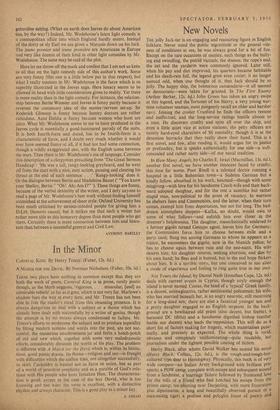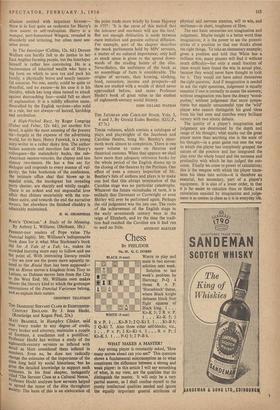New Novels
THE jolly Jack-tar is an engaging and reassuring figure in English, folklore. Never mind the public ingratitude or the general vile- ness of conditions at sea, he was always good for a bit of fun. Except on the rare occasions of mutiny, such things as the bully- ing and swindling, the putrid victuals, the disease, the rope's end, the cat and the yardarm were commonly ignored. Later still, when his pay and diet improved, his quarters became habitable and his death-rate fell, the legend grew even cosier; it no longer seemed odd, when one thought of it, that Jack should be so jolly. The happy ship, the boisterous camaraderie—it all seemed so democratic—were taken for granted. In The First Enemy (Arthur Barker, 12s. 60 John Green has taken an angry swipe at this legend, and the fortunes of his Harry, a very young war- time volunteer seaman, most pungently recall an older and harsher navy. Joining the cruiser Cranford he finds the officers remote and ineffectual, and the long-service ratings hostile almost to a man. He discovers cruelty and spite all over the ship, and even a little quiet vice at action stations; the petty officers are mostly hard-eyed characters of SS mentality, though it is at the detention barracks that they really show their hand. This is a first novel, and few, after reading it, would argue for its justice or profundity, but it speaks authentically for one side—a well- concealed and rather nasty side—of our naval tradition.
In How Many Angels, by Charles E. Israel (Macmillan, 13s. 6d.), another first novel, we have another innocent faced by cruelty, this time far worse. Poor Rindl is a talented doctor running a hospital in a little Bohemian town—a Sudeten German but a kindly fellow, absorbed in his work, besotted—though with some misgiving—with love for his handsome Czech wife and their back- ward adopted daughter, and for the rest a saintlike but rather stupid man, non-political to the point of vacancy. In wartime he shelters Jews and Communists, and the latter, when their turn comes, exempt him from deportation, but not for long. The bad- dream atmosphere deepens—Kafka, no doubt, would own to some of what follows—and enfolds him ever closer in the dreamer's helplessness. The daughter, masochistically enslaved to a fprmer gigolo turned Gestapo agent, leaves him for Germany; the Communists force him to choose between exile and a party card; flung out among Germans to whom he appears as a traitor, he encounters the gigolo, now in the Munich police; he has to choose again between ruin and the neo-nazis. His wife deserts him; his daughter returns, seeking abortion, and dies by his own hand; he flees and is hunted, but in the end hope flickers about him. It is a terrible story, but one conceived in too alien a mode of experience and feeling to ring quite true in our own.
Not Yours the Island, by Daniel Nash (Jonathan Cape, 12s. 6d.) deals with current events in Cyprus, though coyly enough the island is never named. Costas, the head of a 'typical' Greek family, is a decent, unimaginative, rather sentimental policeman; his wife, who has married beneath her, is an angry neurotic, still mourning for a long-dead son; there are also a fanatical younger on and a pretty daughter engaged to an English sergeant. In the back- ground are a bewildered old priest (also decent, but feeble), a harassed DC (ditto) and a handsome dignified bishop (neither feeble nor decent) Who leads the opposition. This will do as a short list of factors making for tragedy, which materialises punc- tually, and precisely as expected. The whole thing is vivid, obvious and completely unilluminating—quite readable, but journalism under the lightest possible coating of fiction.
Harry Black, after whom David Walker has named his novel (Harry Black, Collins, 12s. 6d.), is the rough-and-tough-but- cultured type dear to Hemingway. Physically, this book is of very wide compass—an Indian Army background with brilliant pro- spects; a POW camp, complete with escape and subsequent wound from a landmine, a marriage failure followed by frustrated love for the wife of a friend who had botched his escape from the prison camp; tea-planting near Darjeeling, with more frustration plus dipsomania; a long and beautifully observed pursuit of a man-eating tiger; a profuse and polyglot fount of poetry and
allusion emitted with impatient fervour— there is in fact quite an orchestra for Harry's slow ascent to self-realisation. Harry' is a manqué, part-humanised Wingate, revealed in disorderly and irritating, but often most sen- sitive prose.
In The Interloper (Collins, 12s. 6d.) Doreen Wallace can hardly fail to do justice to her East Anglian farming people, but the Interloper himself is rather less convincing. He is a businessman of inherited wealth who buys a big farm on which to save tax and park his family, a physically brave and nearly success- ful autocrat. No one, surely, could be quite so dreadful, and no excuse—in his case it is his timidity, which has long since turned to attack against encroaching fear—could fall so short of explanation. It is a mildly effective scene, diversified by the English versions—also mild as a rule, but not always—of hatred, hardship and retribution.
A High-Pitched Buzz, by Roger Longrigg (Faber and Faber, 12s. 6d.), yet another first novel, is quite the most amusing of the present six—largely at the expense of the advertising world, for its hero, Henry Fenwick, is a young copy-writer in a rather shaky firm. The author' Makes accurate and merciless fun of Henry's colleagues—the melancholy hacks, the sub- American success-votaries, the clumsy and less clumsy two-timers. He has a fine ear for dialogue and responds to every nuance of vul- garity; the fake bonhomie of the conference, the intimate office chat that blows up in squalid crisis, the incoherent but revealing Party chatter, are sharply and wittily caught. There is an ardent and not ungraceful love affair that chimes uncertainly with the con- fident satire, and towards the end the narrative wavers, but elsewhere the finished ribaldry is admirably maintained.
H. M. CHAMPNESS



































 Previous page
Previous page